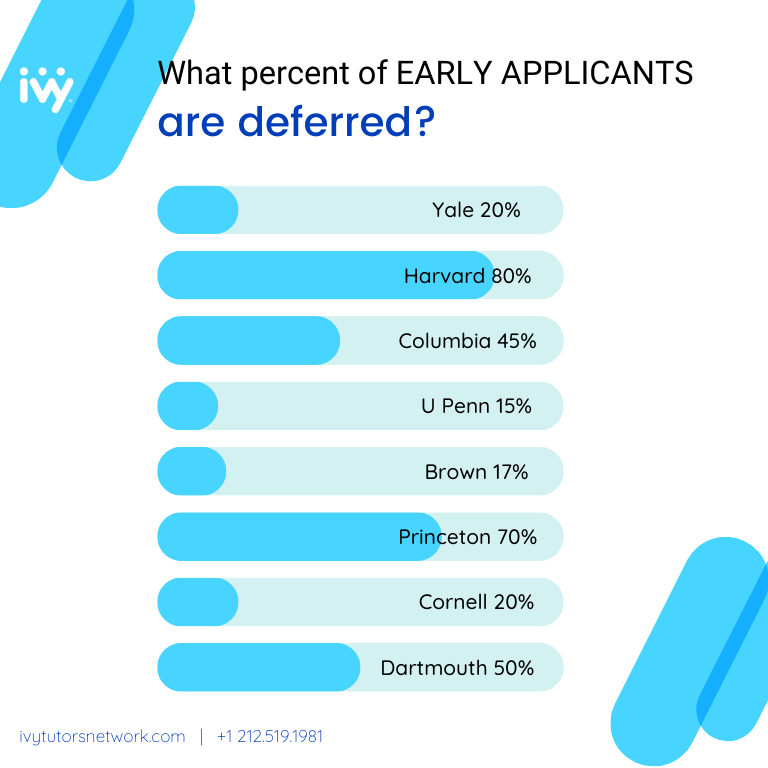
What is Deferred in College Admission?
This blog post will dive into the concept of deferral, why colleges might decide to hit the "pause" button on your application, and the smart moves you can make if you find yourself in this limbo.

Photo by Nathan Dumlao on Unsplash
What is Deferred in College Admission?
Navigating the college admissions maze can be quite the adventure, especially when you get a response that's neither a cheerful "yes", nor a crushing "no." Enter the world of "deferred" admissions!
This blog post will dive into the concept of deferral, why colleges might decide to hit the "pause" button on your application, and the smart moves you can make if you find yourself in this limbo.
What Does Being Deferred Mean?
Getting deferred means that the admissions committee has taken a good look at your application and decided to press the “wait and see” button instead of giving you a straightforward “yes” or “no”. Essentially, they want to review your application again, later in the regular admissions cycle, before making their final call. This often happens to students who apply through early action or early decision programs, which have earlier deadlines and notification dates.
Think of deferral as a sort of “application timeout” – the college isn’t rejecting you, but they aren’t committing to you just yet either. They might want to see how your grades hold up in your senior year, get more context on the entire applicant pool, or consider you alongside a larger group of applicants. It's like they’re saying, “We see potential here, but we need a little more time to decide.” So, while it’s not the instant ticket to acceptance you were hoping for, it’s also not the end of the road.
Top 5 Reasons for Being Deferred from College

Photo by Wesley Tingey on Unsplash
Increased Competition
One of the main reasons for deferral is the sheer volume of applications colleges receive during the early admissions period. Since many highly qualified students apply early, colleges use deferrals as a strategic tool to keep their options open. This allows them to evaluate deferred applicants alongside the regular decision pool— ensuring they have the best possible selection of students for their incoming class. By comparing early applicants with those who apply later, colleges can better manage the balance and diversity of their accepted students.
An Incomplete Application
An incomplete application is another common reason for deferral. If your application is missing additional required documents, such as recommendation letters, transcripts, or standardized test scores, there’s a good chance you’ll be deferred to the regular admissions cycle. Colleges rely on these materials to get a complete picture of your academic performance and personal qualities. If any crucial information is missing, they might defer your application to give you time to submit the necessary documents. This way, they can review your application with all the required components and make a more informed decision.
A Need for Additional Information
Sometimes colleges defer applicants because they want to see more recent academic or extracurricular achievements. They might request your mid-year grades, additional test scores, or updates on any new honors or activities. This is particularly common if your application shows potential but lacks the most up-to-date evidence of your capabilities. By deferring, colleges can wait to see if your performance improves or if you achieve something noteworthy in the latter part of your senior year.
An Application Lacking in Demonstrated Interest
For some colleges, especially those that highly value student engagement and commitment, a deferral can be a test of your genuine interest. They want to see if you continue to interact with the school, visit the campus, or send updates about your accomplishments. This is because demonstrated interest can be a factor in their decision-making process. If you show persistent enthusiasm and engagement, it might boost your chances of acceptance when your application is reviewed again in the regular decision cycle.
The College Needs More Time to Perform a Holistic Review
Many colleges use a holistic review process to evaluate applicants, meaning they consider not just academic metrics but also personal qualities, experiences, and potential contributions to the campus community. If the admissions committee believes they need more context to assess your fit within the broader applicant pool, they might defer your application. This allows them to compare your profile against a wider range of applicants and consider how your unique strengths might complement their incoming class. This thorough approach helps ensure they select students who are not only academically qualified but also diverse in their experiences and perspectives.
Ivy League Deferral Statistics
Deferral rates can vary significantly among Ivy League schools, reflecting their highly selective and competitive nature. Typically, a large percentage of early applicants are deferred, and thus reconsidered during the regular admissions cycle. The process of deferring large numbers of students allows these institutions to evaluate a wider pool of candidates more comprehensively. In recent years, as the number of applicants continues to rise, some schools, like Yale, have chosen to defer fewer students while raising their outright rejection rates.

These numbers highlight the intense competition at Ivy League schools and their strategy of holding off on final decisions for a significant portion of early applicants. Deferring many candidates allows these institutions to make more informed and balanced decisions by considering additional information such as updated grades, new achievements, and the overall applicant pool's diversity and qualifications.
Is a Deferral a Rejection?
No, a deferral is not a rejection. Being deferred simply means that the college has postponed its decision and will review your application again during the regular admissions cycle. While it may be disappointing, it still provides an opportunity for acceptance.
What’s the Difference Between Being Deferred, Waitlisted, and Rejected?
| Decision | Description | Outcome |
| Deferred | Your application has been postponed until the regular decision period | You will be reconsidered for admission at a later time |
| Waitlisted | Your application has not yet been accepted, but you may still be offered admission if space becomes available | You may be accepted if space opens up |
| Rejected | Your application was not accepted for admission | You are not admitted |
Is it Better to be Waitlisted or Deferred?
Whether it's better to be waitlisted or deferred depends on the specific context and circumstances of your application. Both situations present different opportunities and challenges, but each offers a potential path to admission.
Being deferred means that your application will be reconsidered during the regular admissions cycle. This gives you another chance to be evaluated alongside the regular decision applicants. One of the key advantages of being deferred is that you can take proactive steps to strengthen your application, such as submitting updated grades, additional test scores, new recommendation letters, or a letter of continued interest highlighting any recent achievements or changes in your profile. This proactive approach can significantly enhance your chances of admission when your application is reviewed again.
Being waitlisted means that the college has not currently offered you a place, but may do so if spots become available later. This typically happens after the regular decision applicants have been evaluated, and the institution has a clearer picture of its incoming class. The waitlist serves as a backup pool from which the college can draw if they need to fill additional spots. While being waitlisted keeps you in the running, it often leaves you in a more passive position, as your chances of admission depend on how many accepted students decline their offers and other factors beyond your control. However, you can still express continued interest and update the admissions office with significant new accomplishments.
Generally, being deferred provides a clearer path for action and a tangible opportunity to improve your application and increase your chances of acceptance. On the other hand, being waitlisted typically requires patience and a willingness to wait for spots to open up, with less direct opportunity to impact the final decision. Both situations, however, keep the door open for potential admission, and understanding how to navigate each can help you make the most of the opportunity.
Is it Better to be Deferred or Rejected?
It is considered better to be deferred than rejected, because a deferral still leaves the door open for admission. A rejection, on the other hand, means there is no chance for reconsideration.
What to Do When You Have Been Deferred from College?
1. Keep your spirits up!
Being deferred is not the end of the road—far from it. It simply means that the college wants to review your application again later in the regular admissions cycle. Many students who are deferred eventually gain admission, so keep your chin up and stay focused. This is an opportunity to showcase your resilience and continue demonstrating why you’re an excellent candidate for the school.
2. Follow the College's Instructions
Be sure to look to your deferral letter for any specific guidance provided by the college regarding deferred applications. Some schools may have particular guidelines or deadlines for submitting additional materials or information. Adhering to these instructions shows that you are organized, attentive to detail, and genuinely interested in the institution. Following the college’s directions carefully can also ensure that your updated materials are considered in the best possible light.

Photo by Glenn Carstens-Peters on Unsplash
3. Enhance Your Overall Application by Submitting New, Relevant Information
Take this time to bolster your application with any new, relevant materials. For example, you may consider submitting your Senior year grades if they were particularly high or demonstrate a significant improvement from previous years’ grades. Additionally, if you’ve retaken standardized tests with better scores, be sure to send those in as well.
Make sure to also highlight any recent achievements, awards, or new extracurricular activities that demonstrate your growth and commitment. Remember, showcasing engagement in meaningful extracurricular activities or leadership roles can enhance your application. This is especially true if your previous extracurricular activities did not align with your college academic goal.
If possible, consider obtaining an additional letter of recommendation to add a new perspective to your application. Choose someone such as a teacher, mentor, or other significant figure who can offer fresh insights into your character, achievements, and potential. Ensure the recommender knows to highlight any aspects of your abilities and personality that weren’t fully covered in your initial application.
Adding fresh, impressive details can make your application stand out when it's reviewed again.
4. Craft a Strong Letter of Continued Interest (LOCI)
Use this letter to express your deep enthusiasm for the college and to reiterate why it’s your top choice. Mention specific aspects of the school that resonate with you, and explain how you would contribute to their campus community. Share any updates to your application and highlight how these developments make you an even better fit for the school.
In addition to writing a letter of continued interest, you can also showcase your interest in the school by attending relevant events, such as information sessions, or by reaching out to admissions representatives to reaffirm your interest. Maintaining contact with the school shows that you are committed and enthusiastic— which can positively influence the admissions committee’s perception of your dedication.
5. Apply to Other Schools
While you remain hopeful about your deferred application, it’s crucial to keep your options open. Continue applying regular decision to other colleges to ensure you have choices. Diversify your applications to include a mix of reach, match, and safety schools to maximize your chances of admission. This approach not only provides backup options, but also reduces stress by giving you multiple avenues to pursue your academic goals.
How Ivy Tutors Can Help
Remember, a deferral is not the end of the road. Ivy Tutors is dedicated to supporting you every step of the way. Our experts can assist you in drafting a compelling Letter of Continued Interest that effectively communicates your passion and updates the admissions committee on your latest achievements. Our team can help you select the best recommenders to provide new insights into your abilities, advise on strategies to demonstrate continued interest, and identify extracurricular opportunities that align with your academic goal and showcase your commitment and leadership skills.
By leveraging Ivy Tutors' expertise, you can improve your chances of turning a deferral into an acceptance. Remember, persistence and a proactive approach can make a significant difference in the admissions process.




